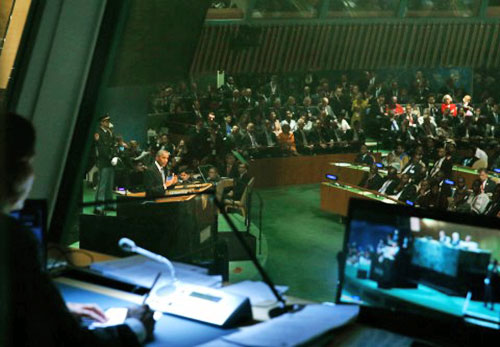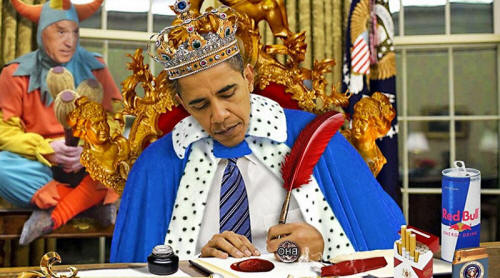|

by Greg Jaffe and David Nakamura
September 20, 2016
from
WashingtonPost Website

President
Obama addresses
the General Debate of
the 71st Session of the United Nations General Assembly
on Sept. 20 at the
U.N.'s headquarters in New York.
(Justin Lane/EPA)
UNITED NATIONS
President
Obama, in his final speech to
the United Nations Tuesday, made an impassioned plea on behalf of
a
liberal world order that he admitted was under growing threat from
wars in the Middle East and rising nationalism at home and in
Europe.
Speaking to the U.N. General Assembly for the eighth and last time
as president, Obama sought to rise above the conflicts of the moment
and outline a future of international cooperation, stressing the
importance of the global liberal institutions formed after World War
II, including the United Nations.
"The world is by many measures less
violent and more prosperous than ever before," Obama said.
But he acknowledged a growing global
unease, fueled by terrorism and economic anxiety, which has led some
Western politicians, including Republican nominee Donald Trump, to
call for tough, new restrictions on immigration and global trade.
Obama often seemed to be speaking simultaneously to history and to
an American electorate facing a historic choice.
The problems plaguing the world called for a "course correction,"
the president said. He then catalogued the crises that have exposed
"deep fault lines in the existing international order," describing
the,
Russia, China under fire in Obama's last U.N address as president
President Obama called on several
nations with which he's had contentious relations to abide by
international rules and do more to improve cooperation on a global
level, while speaking at the United Nations General Assembly on
Sept. 20.
(Reuters)
"Our societies are filled with uncertainty and unease and strife,"
he said. "Despite enormous progress, as people lose trust in
institutions, governing becomes more difficult and tensions between
nations become more quick to surface."
Obama rejected the strongman, top-down model pushed by many of his
international rivals, including Russian President Vladimir Putin
and Chinese President Xi Jinping.
In the same breath he criticized
those who push religious fundamentalism, aggressive nationalism and
a "crude populism" that promises to return citizens to a,
"better and simpler age free of
outside contamination" - a not-so-veiled reference to Trump's
campaign promise to "Make America Great Again."
"We cannot dismiss these visions," Obama said. "They are
powerful."
[Clinton stresses U.S. 'resolve' in
terrorism fight while Trump promises to get 'tough']
Throughout his presidency, Obama has stressed the importance of
diplomacy and international organizations, such as the United
Nations. From his earliest days as a presidential hopeful he has
preached the importance of reaching out to long-standing enemies.
Obama used his speech Tuesday to try to cement that legacy, pointing
to his administration's efforts to restore relations with Cuba and
Burma, and its historic agreement with Iran last year.
"When Iran agrees to accept
constraints on its nuclear program, that enhances global
security and enhances Iran's ability to work with other
nations," Obama said.
The days leading up to Obama's last
United Nations address, like much of his presidency, were dominated
by concerns about war and terrorism.
Obama's remarks came one day after a
manhunt led to the capture of a suspect linked to bombings in New
York and New Jersey and hours after a tenuous cease-fire in Syria
seemed to have collapsed. There were reports that Syrian or Russian
aircraft had struck an aid convoy near Aleppo, just days after
planes from the U.S.-led alliance mistakenly struck Syrian troops.
Obama steered clear of these topics in his speech, focusing on his
broader vision for preserving the international order.
The president spoke of the economic unease caused by globalization,
which has manifested itself during the presidential race in
widespread opposition to international trade deals.
Such agreements,
Obama said, could bolster labor unions in the developing world and
ensure that profits of the global economy are more 'evenly'
distributed.
"A world in which
1 percent of
humanity controls as much wealth as the other 99 percent will
never be stable," Obama said.
He called for more vigilance to
eliminate tax havens, fight climate change and curb the "excesses of
capitalism."
"A society that asks less of
oligarchs than ordinary citizens will rot from within," he said.
At times, Obama's remarks were directed
at his rivals in Russia and China who have in recent years
forcefully pressed an alternative to his vision.
Obama dismissed suggestions by Russia that the West had played a
role in the uprisings in Ukraine, insisting that the Ukrainians were
fighting for universal principles and a more responsive government.
"They took to the streets because
their leadership was for sale and they had no recourse," Obama
said.
He called for more work to resolve the
Israel-Palestinian conflict, an unfulfilled goal of his presidency,
and for more diplomacy to try to halt the bloodshed in Syria.
He
insisted China's buildup in the South China Sea - which he dismissed
as the "militarization of a few rocks" - could not provide a lasting
solution to the territorial disputes there.
In other moments, Obama seemed to be addressing the American
electorate and the deep divisions that have been revealed by the
presidential election.
He rejected the idea that a border wall could
block the spread of disease, in the form of the Zika virus, or
terrorism.
"The world is too small for us to be
able to build a wall and prevent it from affecting our own
societies," Obama said.
The president's references to the
futility of walls drew some chuckles in the General Assembly hall
among world leaders who picked up the reference to Trump.
Near the end of his remarks and in a U.S.-sponsored refugee summit
following his speech, Obama challenged his fellow leaders to do more
to help the growing diaspora of refugees across the globe.
"We are facing a crisis of epic
proportions," Obama said. "I am here today, I called this summit
because this crisis is one of the most urgent tests of our
time."
Many of the world's refugees come from
three countries - Syria, Afghanistan and Somalia - besieged by long
wars with no end in sight.
"The mentality that allows for
violence with impunity is something we cannot excuse, and
collectively we continue to make excuses," Obama said.
"We all
know that
what is happening in Syria, for example, is
unacceptable and we are not as unified as we should be in
pushing to make it stop."
The White House said it had secured $650
million in pledges from the private sector and Obama has promised to
boost the number of refugees the United States accepts next year to
110,000, a 30 percent increase from 2016.
The president concluded his U.N. General Assembly speech by
returning, as he often did in the earliest days of his presidency,
to his remarkable personal story.
"My own family is made up of the
flesh and blood and traditions and cultures and faiths from a lot of
different parts of the world," Obama said.
Obama cited his story as evidence of the existence of universal
ideals and principles that are increasingly under assault in a
globalizing world.
"I can best serve my own people; I
can best look after my own daughters by making sure that my
actions seek what is right for all people and all children,"
Obama said.
'America Must Surrender Sovereignty
...and
Embrace One World Government'
- Said Obama
by Kurt Nimmo
September 22, 2016
from
BlackListedNews Website

Earlier this week Barack Obama
delivered his final
United Nations speech.
In addition to praising
the banksters loan shark
operations run out of
the World Bank and the International Monetary
Fund, Obama called for "global integration," code for a
one-world government.
"I believe that at this moment we
all face a choice.
We can choose to press forward with a better
model of cooperation and integration. Or we can retreat into a
world sharply divided, and ultimately in conflict, along age-old
lines of nation and tribe and race and religion," he said.
In short, Obama has renewed the call to
end national sovereignty.
Full Obama's final 2016 speech at United
Nations...
The Council on Foreign Relations (CFR), often referred to as the
"real
State Department," prefers to call it a transition to "global
governance" or multilateralism.
In 2012, as the CFR unveiled the
Council of Councils and its "Challenges
for Global Governance in 2013,"
Nicholas West deconstructed the globalist agenda.
In addition to eroding national
sovereignty through the promotion of "free trade" deals and
treaties, the CFR has pushed behind the scenes for economic
collapse, humanitarian intervention, destabilization of the Middle
East, geopolitical reorganization, and control of the internet.
"The agenda of global governance
exists, and the move toward a one world government is being
executed.
The solutions being discussed at
think tank conferences in a wide range of disciplines from
geopolitics, to science, to health, to economics and
communications are all beginning to coalesce into an overall
agenda of centralized control.
This fusion is manifesting at an
accelerated pace in tandem with the rapid awakening of humanity
to its condition of increasing servitude," writes West.
The current globalism in trade - from
NAFTA, CAFTA, and AFTA to
the impending TPP - serve as a template for
the ongoing effort to globalize nations and destroy national
sovereignty, according to Richard Haass, current CFR
president and the former Special Assistant to George H. W. Bush and
National Security Council Senior Director for Near East and South
Asian Affairs.
In 2010
Haass wrote,
"states must be prepared to cede
some sovereignty to world bodies if the international system is
to function. This is already taking place in the trade realm.
Governments agree to accept the
rulings of the WTO because on balance they benefit from an
international trading order even if a particular decision
requires that they alter a practice that is their sovereign
right to carry out."
Haass cited the globalist contrivance of
manmade climate change.
"Some governments are prepared to
give up elements of sovereignty to address the threat of global
climate change."
Obama read directly from the globalist
script when he mentioned climate change during his speech at the
United Nations.
"And that's why we need to follow
through on our efforts to combat climate change.
If we don't act boldly, the bill
that could come due will be mass migrations, and cities
submerged and nations displaced, and food supplies decimated,
and conflicts born of despair.
The Paris Agreement gives us a
framework to act, but only if we scale up our ambition.
And there must be a sense of urgency
about bringing the agreement into force, and helping poorer
countries leapfrog destructive forms of energy,"
Obama said.
Bernie Suarez writes
climate change is one of six manufactured problems utilized by the
elite.
"Problem-reaction-solution, the
Hegelian Dialectic is that process the globalist ruling class
have chosen to use as the primary tool to constantly change
society in the direction they want it to go.
They manufacture a problem, focus on
that problem, then sell the solution. The solution is always the
very thing that drives their plan forward."
Specifically,
the global elite,
-
created the
disruptive force of the Islamic State
-
they are pushing for the
implementation of a militarized police state apparatus
-
have
orchestrated revolutions
-
rolled out a propaganda campaign designed
to promote world conflict and a possible Third World War
-
have
engendered disease hysteria that provides a backdrop for medical
tyranny
The United Nations speech was Obama's
swan song and a final tribute to the global elite...
If
Hillary Clinton is elected in
November, we can expect a seamless transition and a continuation of
the CFR's agenda.
|



